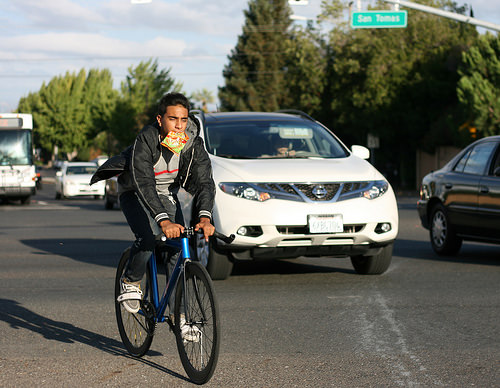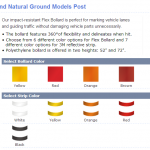Why drivers have anti-cyclist attitudes
Interaction between cyclists and motorists is one of the top causes of biking incidents. In the recently released study “Car driver attitudes, perceptions of social norms and aggressive driving behaviour towards cyclists,” researchers Laura S. Fruhen and Rhona Flin investigate the causes behind drivers’ often aggressively anti-cyclist attitudes.

Unsurprisingly, hostile drivers are mostly people without bikes themselves. Image from Richard Masoner.
Despite the many benefits of cycling, the researchers point out (among them: sustainability, cost-effectiveness, pollution-reduction and health-friendliness), 50 percent of Europeans report never using bikes. Part of the reason behind their decision? A “fear that it is unsafe, particularly in a car-centered society,” explain the researchers. For the study, the researchers surveyed 276 drivers via an online questionnaire asking about their “attitudes towards cyclists, attitudes towards risky driving, perception of social norms concerning aggressive driving towards cyclists, and the frequency with which they engage in such aggressive driving.”
The researchers asked, for example, about attitudes towards cyclists via a nine-item scale that respondents ranked in agreement or disagreement ranging from numbers one to five. One example statement: “It is very frustrating sharing the road with cyclists.” As for attitudes towards risky driving, the researchers posed 11 statements, largely regarding rule violations and speeding, such as “Many traffic rules must be ignored to ensure traffic flow.”
The researchers also questioned respondents on aggressive driving towards cyclists, as well as their attitudes towards those behaviors. The 12-statement scale asked drivers to gauge how often they committed certain behaviors towards cyclists, such as swearing/verbally abusing; physically attacking; sounding the horn; chased; tailgating; making hand gestures, and other aggressive actions.
The results? Drivers who don’t bike were likely to have negative attitudes towards bikers. “Negative attitudes towards cyclists were more pronounced in non-cyclists than cyclists and their association with aggressive driving behavior was stronger in cyclists than non-cyclists,” write the researchers. “The perception of social norms concerning aggressive driving towards cyclists had a stronger association with aggressive driving in non-cyclists than cyclists.” Age and gender played a role in aggressive attitudes and behavior, too: Younger respondents tended to score higher on the aggressive behaviors scale, while male respondents were also more likely to engage in anti-cyclist actions.
But, as the researchers note, the drivers aren’t solely to blame. Future research can fill in the gaps left behind from this study, they suggest, by observing aggressive behavior (as opposed to relying on self-reported results as in this study). Other factors that weren’t addressed in this study, such as general aggressiveness or other control variables, may also impact driver aggression beyond what was pinpointed here.
How can safety be improved, then? One suggestion is to target these negative attitudes with a campaign designed to improve cycling’s safety and appeal. Campaigns reaching out to non-cyclists and drivers in particular might help reduce negative views, while campaigns highlighting cycling’s benefits, such as pollution reduction, might make the practice more appealing to those who usually travel on four wheels instead of two.
Discover the study in its entirety online here.
Related Posts
Category: Transportation

















